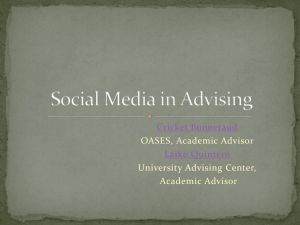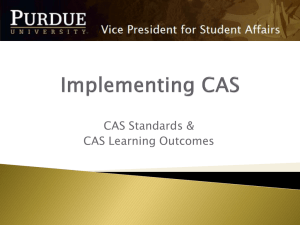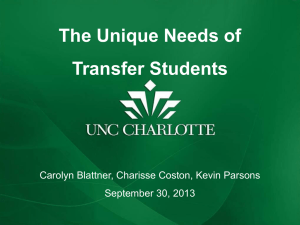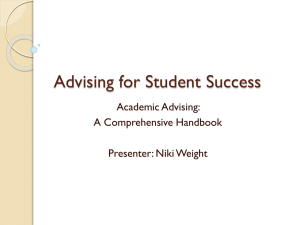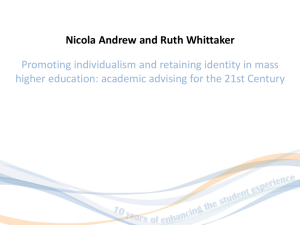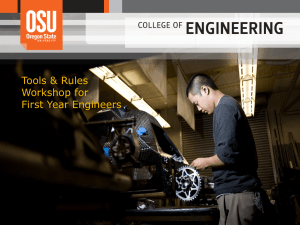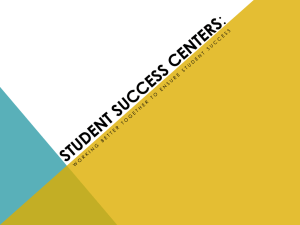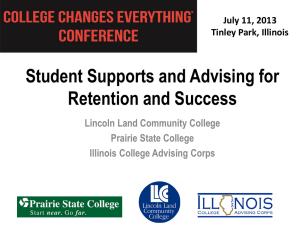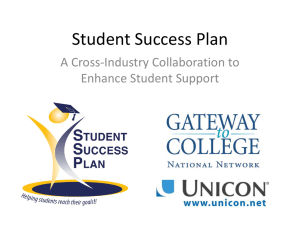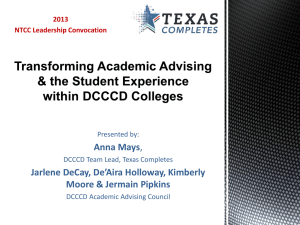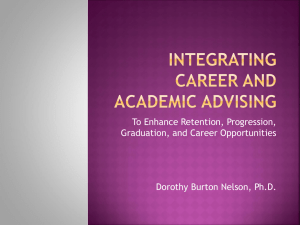College of Mass Communication
advertisement
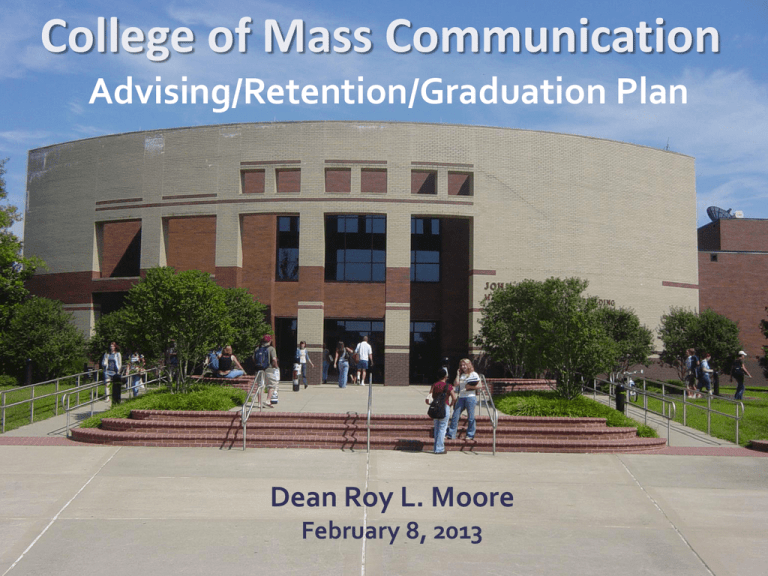
College of Mass Communication Advising/Retention/Graduation Plan Dean Roy L. Moore February 8, 2013 College Enrollments Enrolled Undergraduate Graduate 4000 3500 2793 2717 3000 2662 2565 2528 2441 2500 2000 1500 1000 500 88 80 76 75 74 70 0 2007 2008 2009 2010 2011 2012 Year College Graduates 600 550 500 450 400 350 300 250 200 150 100 50 0 565 24 142 546 505 25 162 466 18 19 457 103 25 97 128 234 165 Graduate J-School 234 131 235 193 127 201 RI EMC 142 135 2007/08 2008/09 2009/10 2010/11 2011/12 Current College-Wide Advising • Open advising by academic advisors & faculty every semester • Pre-candidacy advising by UCAC & MC academic advisors • Faculty advisors assigned to students with candidacy • “Walk-in Wednesdays” with no appointment needed for advising • Interactive advising guidebook • Advising orientation/workshops for new faculty • Academic advisors meet with department faculty for updates/changes once a semester or as needed • Future Advising Initiatives Develop Student-Centered Culture • Strengthen advising through faculty workshops, online access of candidacy applications & upper-division forms as well as infographic versions of curricular maps • Hire college staff to coordinate advising & retention efforts; serve as graduation coach • Create browse-able, user-friendly & compelling catalog • Continuously evaluate tools/procedures/methods & implement changes such as one day processing policy on course substitution & designating program-specific candidacy codes • Develop peer mentoring & tutoring system College-Wide Initiatives Curriculum Development • New program offerings that reflect industry changes & new accreditation standards • Utilize online learning resources such as Lynda.com • Increase online or hybrid courses, experiential learning, study abroad & capstone courses • Strengthen or develop new graduate programs • • College-Wide Initiatives Continued Raise Academic Standards • Implement more rigorous candidacy requirements • Revise major field test • Examine alternative path for students not achieving candidacy • Identify parallel path to candidacy for transfer students • Attract better prepared students through strategic marketing & student recruitment campaign • Provide showcase for students’ best work College-Wide Initiatives Continued Improve Culture of Engagement • Increase student involvement in student organizations & co-curricular opportunities in Center for Innovation in Media, Seigenthaler Chair, MT Poll … • Develop community relationships & partnerships • Strengthen industry relations through advisory boards, guest speakers, visiting artists & scholars • Establish new program-specific student organizations to develop community within specializations • Alumni outreach College-Wide Initiatives Continued Enhance Student Access to Technology & Facilities • Regular upgrade of software & hardware in labs & studios • Course or lab fee needed to enable college to meet maintenance & currency requirements & reduce reliance on TAF funding • Provide technical support staff in all academic units Electronic Media Communication • A strategic analysis of the department was conducted in 2011-12. – Student interviews – Alumni interviews (emphasis on recent grads) – Department-wide participation – Use of available studies – SWOT analysis – Market analysis Electronic Media Communication • Primary issues identified in the strategic analysis: – – – – – Graduate success and satisfaction Lack of depth in the major (accreditation issue) Gaps in curriculum Challenges of staying current (curriculum & faculty) Advising issues due to catalog discrepancies & delays with student records – Community relations (internal & external) – Weak marketing, communications, & culture Electronic Media Communication • Cleaned up advising issues – Numerous errors have been corrected in the catalog, upper division forms, and on Banner. – Turnaround of student academic record updates has been expedited. (transfer credits and course substitutions) Electronic Media Communication • Improving advising – Advisor training each semester – Promoting Open Advising – Using new channels to help students understand our curriculum, our programs, opportunities, etc. • Better, more helpful descriptions – More active communication & coordination between advisors Electronic Media Communication • Improving advising: next steps – Info-graphic versions of academic maps – Design a new approach to student records in Banner: Student profile pages – Build a user-centric browse-able online catalog – Engage a research company to study the student experience at MTSU Electronic Media Communication • Lack of depth in the major – Pursuing a change of accreditation body – Added 8 hours to the major – Adding hands-on lower division courses Electronic Media Communication • Evolving our curriculum – Updates across the department – MFA program in conjunction with Recording Industry – Raise the bar for candidacy – Provide programs for University Studies majors – Better programs for minors and Gen Ed students – Better integration with TN Transfer Pathway Electronic Media Communication • Provide better support to students – Establish annual funding for software and hardware updates – Budget for supporting student activities such as remote productions, sets, materials and supplies, competition and festival fees, travel to events, etc. Electronic Media Communication • Starting new student organizations – New Media Club – Photography Society – National Broadcasting Society • Supporting existing student organizations – MT10 – WMTS – Film Guild Electronic Media Communication • Communications & cultural issues – Creating more shared experiences – Elevating EMC Productions to “varsity team” – Embracing social media: blog, Facebook, etc. – Weekly Friday Forum – Showcasing exemplary student work • First Look festival • Competitions & festivals – Baldwin Photo Gallery in Mass Comm Electronic Media Communication • Attracting qualified students – Changing program names to vernacular terms – Participation at events such as career fairs and Nashville High School Academy Awards – Marketing-oriented website – Brochure-in-a-business-card – TEDx Conference (proposed Spring 2014) – Blue Spark Awards (next page) Electronic Media Communication • Partner with private sector – Capitol Records Street Party, DWP Live, CT Touring, etc. – Internships – Advisory board – Classroom visits Department of Recording Industry • In keeping with the University Master Plan, the Department of Recording Industry’s retention plan takes a student centered approach to better serve, inform, and educate students. The plan is focused on six key areas for initiatives: – Technology and Facilities – Advising – Program & Curriculum – Student Life – Enrollment – Administrative Systems Department of Recording Industry Technology and Facilities • Retention Goal: Improve and enhance student access to technology and facilities • Increase the student to computer ratio in RI Labs to a 1:1 ratio. • Require a basic technology package for all students: Laptop and select software. • Provide students with subscriptions to lynda.com. Department of Recording Industry Technology and Facilities • Institute a technology fee for all • Continued Relocate studios and classrooms that are in Recording Industry students to fund condemned buildings and isolated regular technology updates, locations to a centralized secure facility lynda.com subscriptions, and continual facility improvements. • Increase the number of production facilities so that students are not required to work overnight. and improve all classrooms to create environments more conducive to learning Department of Recording Industry Curriculum and Program Retention Goal: Enhance and improve the program offerings to stay current with industry and serve student demand. • • • • Modernize the curriculum to better reflect the current state of the industry. Focus on live event production. Build more partnerships with programs across campus to create more collaborative and interdisciplinary student work environments. Build stronger ties with industry through advisory committees, guest speakers, and visiting artists. Bring more industry professionals to campus as adjuncts to teach specialized, cutting edge classes Department of Recording Industry Advising Retention Goal: Increase student and faculty awareness of department programs, policies, and degree requirements. • Continue having two full weeks of • advising and degree information a central piece • all department policies and curriculum registration. Hold “Infofest”, a comprehensive department orientation event, each semester for new students. Publish a printed detailed department information guide each year containing open advising before and during • Improve the Department website with requirements. • Continue the faculty advising committee to exchange ideas and best practices. • Hold semi regular student/faculty forums Department of Recording Industry Student Life Retention Goal: Enhance student lifestyle to increase every student’s “time on task” and “time on campus” • Increase student involvement in student organizations. • Bring students into the major earlier in their academic career. • Offer peer tutoring for core courses in the curriculum. Continue growing the student record label by producing more special events and building partnerships with major labels and publishers. Department of Recording Industry Enrollment and Recruitment Retention Goal: Increase the percentage of pre-candidacy students who receive candidacy without increasing the total number of students accepted into candidacy. • Award candidacy upon admission to the university. • Enhance recruitment efforts to attract more students from technical and creative backgrounds. • Examine alternate path to candidacy for transfer students. Department of Recording Industry Administrative Systems and Customer Service Retention Goal: Improve the departmental administrative systems to better serve students. • Put candidacy applications online to streamline and improve the process. • Create an online system for Upper Division forms. • Examine course offerings each semester to ensure that course offerings are focused on facilitating student progression toward graduation. • Better facilitate students in their final year before graduation by offering a wider range of upper division courses online, in Nashville, and in “Weekend College” format. • Hold regular brain-storming meetings among front line personnel to identify solutions to administrative problems. School of Journalism • Offer Media Studies concentration • Faculty review of candidacy process: improve writing competencies, create writing proficiency exam • New major orientation • Enhance TN Transfer Pathways to expedite smooth transition • Excellence in faculty advising award • Increase student-generated content on school website School of Journalism Continued • Update brochure & other marketing materials • Sponsor events such as Scripps National Spelling Bee as part of • Increase visits to area high schools recruitment of talented students & junior colleges • Dual enrollment/credit opportunities • Student Ambassadors program • Participate in advertising & similar student competitions • Increase faculty-student research/creative project collaboration School of Journalism Continued • Promote excellence by continuing • support of such organizations as Kappa Tau Alpha Honor Society Establish Student Persistence Award ($500) • Student portfolio reviews by professionals • Enhanced use of exit interviews including Graduating Student Survey to strengthen existing programs
